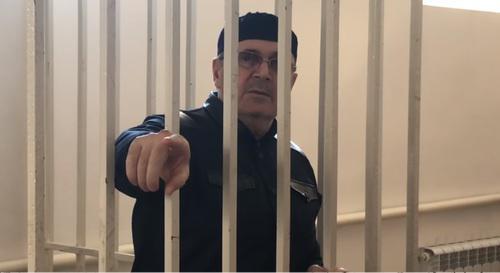Ten signs of fabrication in Oyub Titiev's case reported before verdict
On March 18, in Chechnya, a court will pronounce the verdict to Oyub Titiev, the head of the Human Rights Centre (HRC) "Memorial" office in Grozny. The defence has managed to draw attention to the trial, and that fact will positively affect the Oyub Titiev's reputation and security, his advocate believes. The HRC "Memorial" presented 10 facts proving the falsification of Oyub Titiev's case.
The police did not check the complaint of the human rights defender who stated the drugs had been planted to him. On the day of the Oyub Titiev's detention, his advocate Sultan Telkhigov was not allowed to visit his client for six hours, and at that time, law enforcers took washout samples from the detainees' hands.
According to investigators, video cameras at the police station and all the video surveillance cameras on the Oyub Titiev's way did not work on the day of his detention. The court also did not request the billing of Oyub Titiev's mobile phones, which he had with him on the day of his detention and which later disappeared.
The testimony of the law enforcer, who "saw" drugs in the Oyub Titiev's car, should have been checked at the investigative experiment, but no real circumstances were arranged.
The key witness for the prosecution the only person who claimed that Oyub Titiev smoked anasha did not recognize the human rights defender during his identification. The version of the witness, a drug addict with an earlier criminal record, is contradictory and is entirely based on contingencies.
Oyub Titiev stated that his first detention, which was not formalized by the law, was conducted by members of the rapid response team (known as GBR). The law enforcers argued that there was no GBR unit in the police, although its presence was confirmed by official press releases of the Ministry of Internal Affairs (MIA).
The main material evidence in the case a package of marijuana and a scotch tape with an Oyub Titiev's hair are unacceptable evidence, insists the defence. There was no scotch tape on the package with marijuana: it appeared later, when Oyub Titiev was tricked for taking his hair sample. Another evidence roll-ups with marijuana which law enforcers "found" after the Oyub Titiev's detention on the balcony of the HRC "Memorial" office turned out to be so unconvincing that the prosecution finally did not use it.
This article was originally published on the Russian page of 24/7 Internet agency ‘Caucasian Knot’ on March 17, 2019 at 10:57 pm MSK. To access the full text of the article, click here.





![Tumso Abdurakhmanov. Screenshot from video posted by Abu-Saddam Shishani [LIVE] http://www.youtube.com/watch?v=mIR3s7AB0Uw Tumso Abdurakhmanov. Screenshot from video posted by Abu-Saddam Shishani [LIVE] http://www.youtube.com/watch?v=mIR3s7AB0Uw](/system/uploads/article_image/image/0001/18460/main_image_Tumso.jpg)